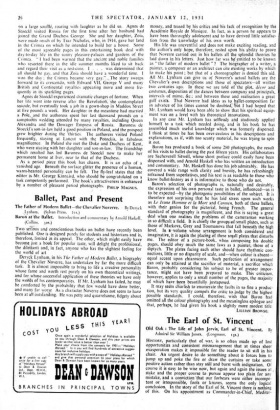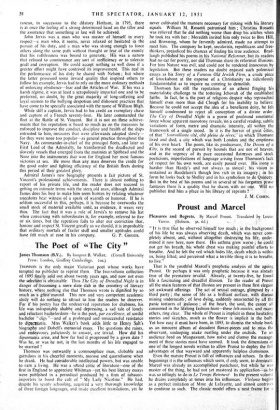The Earl of St. Vincent
Old Oak : The Life of John Jervis, Earl of St. Vincent, By Admiral Sir William James. (Longmans. Iss.) HIS1ORY, particularly that of war, is so often made up of lost opportunities and consistent mismanagement that at times sheer exasperation makes it impossible for the reader to sit still in his chair. An urgent desire to do something about it forces him to jump up and poke the fire or draw the curtains or take some positive action rather than stay still and burst with indignation. Of course it is easy to be wise now, but again and again the issues at, stake and the proper course to pursue appear too plain for any mistake, and a conviction 'that our forbears were either incompe- tent or irresponsible, fools or knaves, seems the only logical conclusion. In the story of the Earl of St. Vincent there is nothing of this. On his appointment as Commander-in-Chief, Mediter- i ranean, In succession to the dilatory Hotham, in 1795, there is at once the feeling of a strong determined hand on the tiller and the assurance that something at last will be achieved.
John Jervis was a man who was master of himself in every respect—a man who, it seems, never relaxed or hesitated in the pursuit of his duty, and a man who was strong enough to force others along the same path without thought or fear of the enmity that his ruthlessness was bound to generate. His was a nature that refused to countenance any sort of inefficiency or to tolerate graft and corruption. He could accept nothing as well done if a greater effort might have contrived its improvement. This zeal in the performance of his duty he shared with Nelson ; but where the latter possessed some inward quality that inspired others to follow his example, Jervis had to rely on the more ordinary methods of enforcing obedience—fear and the Articles of War. If his was a harsh regime, it was at least a scrupulously impartial one and to be preferred, no doubt, by the groat majority of long-suffering and loyal seamen to the bullying despotism and dishonest practices that have come to be specially associated with the name of William Bligh.
While still a captain, Jervis had to his credit an exemplary chase and capture of a French seventy-four. He later commanded the fleet at the Battle of St. Vincent. But it is not on these achieve- ments that his reputation is based so much as on the measures he enforced to improve the conduct, discipline and health of the ships entrusted to him, measures that were afterwards adopted slowly— for they were none too popular—as general practice throughout the Navy. As commander-in-chief of the principal fleets, and later as First Lord of the Admiralty, he transformed the disaffected and slovenly vessels that emerged from the mutinies at Spithead and the Nore into the instruments that won for England her most famous victories at sea. He more than any man deserves the credit for the good order and lighting efficiency of the British fleets during this period of their greatest glory.
Admiral James's new biography presents a fair picture of St. Vincent's professional achievements. There is almost nothing to report of his private life, and the reader does not succeed in getting on intimate terms with the stern, old man, although Admiral James does his best to make him seem human by relating whatever anecdotes bear witness of a spark of warmth or humour. If he is seldom successful in this, perhaps, it is because he overworks the small stock of material available until, as evidence, it wears very thin. The fact that it was a rule of Jervis's to remove his hat When conversing with subordinates is, for example, referred to five or six times, but the repetition fails to alter our conviction that, honour and respect St. Vincent greatly as we should, it is improbable that ordinary mortals of frailer stuff and smaller aptitudes could have felt much at case in his company. G. P. GRIGGS.



































 Previous page
Previous page